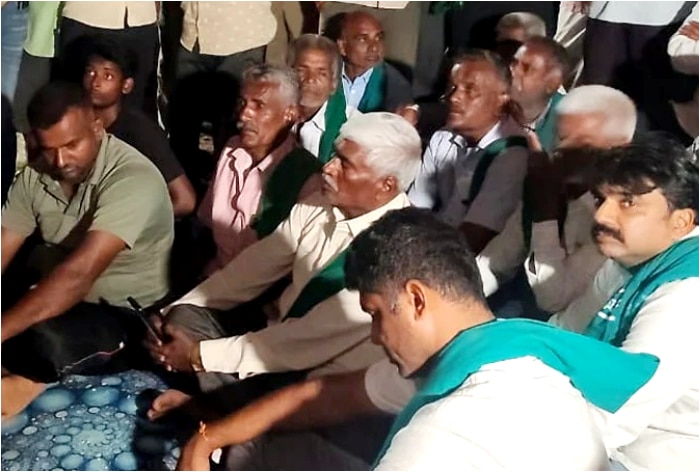Vigilant Karnataka Farmers Stage Overnight Protest Against Cauvery Water Release

Vigilant Karnataka Farmers Stage Overnight Protest Against Cauvery Water Release
In a fervent display of their determination, farmers in the Mandya district of Karnataka held an impassioned overnight protest against the proposed release of Cauvery water to Tamil Nadu. The resolute farmers’ protest unfolded against the backdrop of a recent recommendation by the Cauvery Water Regulation Committee. The committee suggested that Karnataka allocate 5,000 cubic feet per second (cusecs) of water to Tamil Nadu over the upcoming 15 days. This contentious issue has escalated as Tamil Nadu took the matter to the Supreme Court, urging Karnataka to release a higher volume of 24,000 cusecs of Cauvery water.
The night-long protest, which drew together farmers from various parts of Mandya, underscored the emotional connection and dependency that these farmers have on the Cauvery River. Amidst chants of unity and gripping placards, the farmers illuminated the darkness with their determination to protect their interests and secure their livelihoods. The scene depicted a poignant portrayal of their ongoing struggle against water-sharing agreements and the ensuing agricultural uncertainties.
The trigger for this spirited protest was the Cauvery Water Regulation Committee’s proposal. While the committee’s recommendation of releasing 5,000 cusecs of water may have been motivated by the intention to address Tamil Nadu’s water needs, it struck a discordant note in Karnataka. Farmers from the state, particularly in Mandya, voiced their concerns over the potential ramifications of diverting such a substantial volume of water to a neighboring state.

It is essential to note that the Cauvery River has historically been the lifeblood of Karnataka’s agrarian landscape. The farmers in Mandya rely on its waters to irrigate their crops, ensuring bountiful harvests and sustenance for their families. The intricate relationship between these farmers and the river goes beyond mere sustenance; it forms the basis of their cultural heritage and the backbone of their community.
One of the significant catalysts for the protest’s intensity was Tamil Nadu’s plea in the Supreme Court. The demand for 24,000 cusecs of Cauvery water resonated across the southern region, stirring debates and emotions alike. While water-sharing disputes are not novel, they consistently evoke deep-seated sentiments and anxieties among farmers whose very existence is intricately woven with the river’s ebb and flow.
As the night wore on, farmers from different age groups and walks of life participated in the protest. Their unity showcased the unwavering resolve to safeguard their agricultural activities, even as urbanization and industrialization transform the landscape around them. The protesters’ vigor and passion were palpable, as they utilized this peaceful platform to convey their concerns to authorities and draw attention to their plight.
In a statement to the press, one of the protesting farmers, Rajesh Kumar, expressed, “We are not against sharing water, but it’s about finding a balanced solution. Our crops and our families depend on the Cauvery’s blessings. Any decision about its waters should factor in our needs and concerns too.”

While the protest primarily centered around agricultural interests, it also tapped into broader environmental apprehensions. Many protesters raised questions about the sustainability of diverting substantial water volumes to neighboring states, given the increasing demands of both agriculture and urban centers. Such concerns reflect a growing awareness of the delicate ecological balance and the necessity for equitable distribution.
The protest’s impact was felt across the state, garnering support from various quarters. Social activists, environmentalists, and even some political figures voiced their solidarity with the farmers’ cause. The protest’s peaceful nature and genuine concerns resonated with people who empathize with the challenges faced by those who toil to bring food to our tables.
This incident is also a reminder of the intricacies involved in managing water resources in a densely populated and agriculturally dependent country like India. Water, often termed “blue gold,” is a finite and precious resource that holds the key to the nation’s sustenance and development. Balancing the needs of various states and regions while ensuring the well-being of those directly tied to the land is a formidable task.
As dawn broke over the protesting farmers, their resilience remained unshaken. The overnight protest encapsulated the essence of their struggle—a fight not just for water but for their heritage, identity, and way of life. Their unity underscored the importance of empathetic dialogues and comprehensive agreements that take into account the concerns of all stakeholders involved.

In conclusion, the overnight protest staged by Karnataka’s farmers in Mandya against the release of Cauvery water exemplifies the profound interplay between water, agriculture, culture, and identity. The emotions and energy displayed during this protest underscore the imperative of sustainable and inclusive solutions that respect the needs and aspirations of all parties involved. As the sun rose on this resolute gathering, it cast light on the complexity of managing water resources and the unwavering spirit of those who depend on them.




